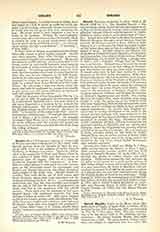

Gerardus Odonis, also GERALDUS OTHONIS, or OTTONIS, a medieval theologian and Minister General of the Franciscan Order; b. probably at Chateauroux, in the present department of Indre, France, date unknown; d. at Catania, Sicily, 1348. Whether he was the son of Count Andre de Chauvigny is very doubtful. After he had entered the Order of St. Francis, most probably at Chateauroux, and consequently had belonged to the Touraine province of the order, he became a member of the Aquitanian province and still belonged to this latter (without, however, being provincial minister) when he was elected minister general of the order, June 10, 1329, at the general chapter. The presiding officer of this chapter was Cardinal de la Tour, a Franciscan, whom John XXII (1316-34) had appointed vicar-general of the order. The previous minister general, Michael of Cesena, had been deposed by John XXII on June 6, 1328, on account of his rebellious attitude towards the Holy See in the discussion regarding the rule of poverty (see Fraticelli and Michael of Cesena). Gerardus Odonis was inclined to give up poverty, the principle of the order, on account of which Michael of Cesena had come into conflict with the pope. The general chapter held at Paris (1329) took a position, in the name of the entire order, on the side of the pope and formally expelled the small party made up of Michael of Cesena‘s adherents which opposed the Holy See.
Gerardus Odonis openly showed his readiness to abandon the rule of poverty at the general chapter of Perpignan (1331), where he won over to his side four-teen provincial ministers. In reference to this question they presented a petition to John XXII which the pope rejected in the consistory of August 1, 1331. Owing to his lax views concerning poverty Gerardus also became entangled in a dispute with King Robert and Queen Sanzia of Naples and Sicily. These rulers were unwavering protectors of the rigid adherents to the rule of poverty as well as of the followers of Michael of Cesena and of the Fraticelli. Notwithstanding the papal letters of admonition and the fact that John XXII sent Gerardus Odonis as his representative to the Court of Naples in 1331 and the following year, Gerardus had new statutes drawn up with the view of changing the form of the Franciscan Order to that of the old orders of monks. These regulations were confirmed, November 28, 1336, by Benedict XII (1334-42); consequently Gerardus was able at the chapter held at Cahors, June 7, 1337, to obtain, in spite of the statutes remain in force longer than the lifetime of Benedict XII and the period during which Gerardus was general. The general chapter of Assisi abrogated, June 1, 1343, the “Constitutiones Benedictina” and reenacted, with some additions, the constitutions of Narbonne (1260).
There is some truth in the assertion made as to Gerardus Odonis that he both resembled and imitated Brother Elias, the lax minister general second in succession from St. Francis of Assisi; indeed, he even exceeded Elias. However, it must be said to his credit that, in union with the pope, he zealously promoted Franciscan missions, constantly sending fresh missionaries to Persia, Georgia, Armenia (1329); Malabar (1330), China and Tatary (1331); Bosnia (1340). In 1329 John XXII sent him to King Charles Robert of Hungary and to Ban Stephen of Bosnia for the purpose of bringing about the extermination of the heretics, largely Patarenes, in these countries. On September 5, 1333, Gerardus and the Dominican Arnauld de Saint-Michel (Arnaldus de S. Michaele) were appointed papal legates to make peace between the Kings of England and Scotland. The procurator of the Scotch king in Paris having reported, however, that his master was not to be found in Scotland, John recalled the commission of the legates, October 31, 1333. Gerardus remained in Paris and defended before a large number of professors of the university, on December 18, 1333, the opinion of John XXII concerning the Visio beatifica, namely, that the saints do not enjoy the complete Beatific Vision until after the Last Judgment. The University of Paris was greatly agitated by the controversy, and the next day, December 19, Philip VI called together twenty-nine professors at Vincennes to discuss the question. This assembly dissented from the opinion of the pope, as did also a second assembly which met January 2, 1334. As is known, John XXII withdrew his opinion, December 3, 1334. Gerardus Odonis was also one of the commission of sixteen masters of theology which met by command of Benedict XII from July 4 to September 4, 1334, at Pont-Sorgues near Avignon, to discuss, under the pope’s presidency, the question of the Visio beatifica. On November 27, 1342, Benedict XII appointed him Patriarch of Antioch and at the same time administrator of the Diocese of Catania, Sicily.
Apart from the “Constitutiones Benedictinae” and the “Officium de stigmatibus S. Francisci”, still recited in the Franciscan Order and commonly attributed to Gerardus, the best known of his writings is his “Commentarius [Expositio] in Aristotelis Ethicam” (Brescia, 1482, Venice, 1500). This work brought him the honor later of being called Doctor Moralis. He also wrote on logic and a treatise entitled “Philosophia Naturalis”, in which he is said to have apparently taught Atomism; another work was a “Commentarius in IV libros Sententiarum”. Among his exegetical works are: “De figuris Bibliorum”, and treatises on the Psalter, the First Epistle to the Corinthians, and the Epistle to the Galatians, besides “Sermones”. In addition to taking severe measures against the adherents of the deposed Michael of Cesena, Gerardus addressed to the latter the writing “Quid niteris”, to which, however, Cesena soon made a rejoinder beginning “Teste Salomone”.
MICHAEL BIHL.

